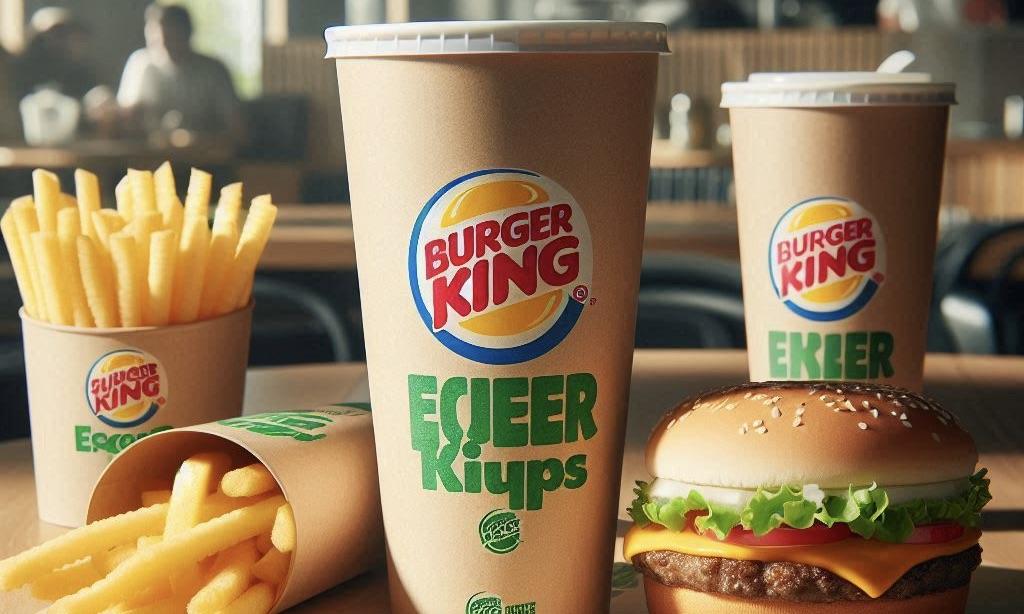Burger King is testing newly designed recyclable cups in Finland, potentially setting a new standard for fast-food packaging sustainability.
Burger King Collaborates with Sulapac in Finland to Test Recyclable, Biodegradable Packaging Solutions
In a recent news by The Cool Down, an intriguing examination of the potential for fast-food chains to incorporate new materials to advance toward a circular economy.
One significant obstacle to efficiently recycling materials is fast-food packaging, which frequently includes a dense coating that is challenging to process.
A Finnish restaurant and catering company has been exploring alternatives to this issue, leveraging a novel form of fast-food packaging that is both recyclable and reusable.
Renewable Carbon News reports that Restel employs Sulapac material for containers in two Burger King locations. The reusable containers are available for customers to return at designated restaurant locations after use. It is reported that a single cup can be utilized 200 times before being sent to Sulapac for recycling at the end of its lifecycle.
Heidi Peltola, the director of products at Sulapac, stated that the product is entirely biodegradable and can be composted in an industrial setting. This implies that it can decompose naturally, thereby avoiding the potential production of microplastics.
"All our materials can be digested by naturally occurring microbes," Peltola said. "Hence, Sulapac materials do not accumulate in the food chain, unlike conventional plastic.”
Microplastics have been discovered in virtually every corner of the world. They can accumulate in marine organisms' bodies in the oceans and infiltrate the human body through seafood consumption.
The Guardian summarized a study published in Toxicological Sciences that discovered microplastics in all 23 human testicles and 47 dog testicles that the scientists tested. The researchers hypothesized that this could be associated with decreased sperm counts.
Study Links Microplastics to Health Risks as Burger King Tests Sustainable Packaging Solutions in Finland
A New England Journal of Medicine study discovered microplastics in artery plaque samples. The study also noted that the presence of this material in the human bloodstream could increase the risk of heart attack, stroke, or mortality, as The Conversation detailed. Therefore, it is imperative to take all necessary measures to mitigate plastic consumption in daily life to promote human health.
Restel's sustainability and communications manager, Anna Koskinen, stated, "We can advance the circular bioeconomy and mitigate the negative climate and environmental impacts associated with single-use and oil-based plastic by collaborating with Sulapac."
Restel's solution is intriguing; however, it will be implemented at the restaurants after a two-month trial period. The question of how this could be applied to larger markets, such as the United States, also arises. Processing larger quantities of recyclable containers may be more challenging if the requisite technology is unavailable.
However, for the time being, it provides an intriguing perspective on the potential for fast-food chains to incorporate new materials to advance toward a circular economy. Burger King may also gain insight into the potential benefits of adopting more environmentally friendly practices to increase consumer loyalty.
Photo: Microsoft Bing



 OpenAI Pentagon AI Contract Adds Safeguards Amid Anthropic Dispute
OpenAI Pentagon AI Contract Adds Safeguards Amid Anthropic Dispute  FCC Approves Charter Communications’ $34.5 Billion Acquisition of Cox Communications
FCC Approves Charter Communications’ $34.5 Billion Acquisition of Cox Communications  Nintendo Share Sale: MUFG and Bank of Kyoto to Sell Stakes in Strategic Unwinding
Nintendo Share Sale: MUFG and Bank of Kyoto to Sell Stakes in Strategic Unwinding  Trump Warns Iran as Gulf Conflict Disrupts Oil Markets and Global Trade
Trump Warns Iran as Gulf Conflict Disrupts Oil Markets and Global Trade  Meta Signs Multi-Billion Dollar AI Chip Deal With Google to Power Next-Gen AI Models
Meta Signs Multi-Billion Dollar AI Chip Deal With Google to Power Next-Gen AI Models  Boeing Secures $166.8 Million U.S. Navy Contract for P-8A Engineering and Software Support
Boeing Secures $166.8 Million U.S. Navy Contract for P-8A Engineering and Software Support  Paramount Skydance to Acquire Warner Bros Discovery in $110 Billion Media Mega-Deal
Paramount Skydance to Acquire Warner Bros Discovery in $110 Billion Media Mega-Deal  Trump Orders Federal Agencies to Halt Use of Anthropic AI Technology
Trump Orders Federal Agencies to Halt Use of Anthropic AI Technology  OpenAI Hires Former Meta and Apple AI Leader Ruomin Pang Amid Intensifying AI Talent War
OpenAI Hires Former Meta and Apple AI Leader Ruomin Pang Amid Intensifying AI Talent War  FAA Plans Flight Reductions at Chicago O’Hare as Airlines Ramp Up Summer Schedules
FAA Plans Flight Reductions at Chicago O’Hare as Airlines Ramp Up Summer Schedules  Samsung and SK Hynix Shares Hit Record Highs as Nvidia Earnings Boost AI Chip Demand
Samsung and SK Hynix Shares Hit Record Highs as Nvidia Earnings Boost AI Chip Demand  Flare, Xaman Roll Out One-Click DeFi Vault for XRP Yield via XRPL Wallets
Flare, Xaman Roll Out One-Click DeFi Vault for XRP Yield via XRPL Wallets  Netflix Declines to Raise Bid for Warner Bros. Discovery Amid Competing Paramount Skydance Offer
Netflix Declines to Raise Bid for Warner Bros. Discovery Amid Competing Paramount Skydance Offer  Trump Media Weighs Truth Social Spin-Off Amid $6B Fusion Energy Pivot
Trump Media Weighs Truth Social Spin-Off Amid $6B Fusion Energy Pivot  Hyundai Motor Group to Invest $6.26 Billion in AI Data Center, Robotics and Renewable Energy Projects in South Korea
Hyundai Motor Group to Invest $6.26 Billion in AI Data Center, Robotics and Renewable Energy Projects in South Korea  Snowflake Forecasts Strong Fiscal 2027 Revenue Growth as Enterprise AI Demand Surges
Snowflake Forecasts Strong Fiscal 2027 Revenue Growth as Enterprise AI Demand Surges  APEX Tech Acquisition Inc. Raises $111.97 Million in NYSE IPO Under Ticker TRADU
APEX Tech Acquisition Inc. Raises $111.97 Million in NYSE IPO Under Ticker TRADU 































